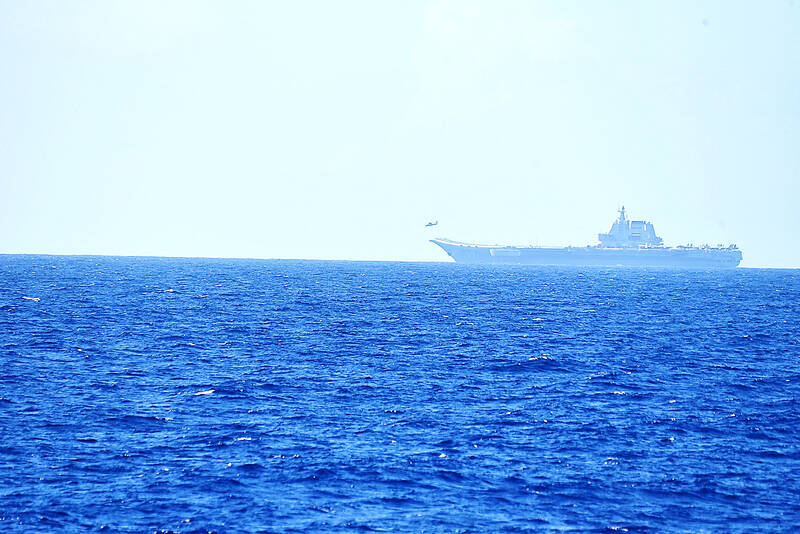China sailed its aircraft carrier the Shandong through waters southeast of Taiwan into the western Pacific Ocean for a long-range exercise yesterday, the Ministry of National Defense said in a news release.
The ministry said it keeps close tabs on Chinese military activity through joint intelligence and surveillance.
Early yesterday it tracked the Shandong as it passed through the waterway 60 nautical miles (111km) southeast of Oluanpi (鵝鑾鼻), Taiwan’s southernmost tip, and headed east into the western Pacific Ocean for a long-range training session in the area.

Photo: Reuters / Joint Staff Office of the Japanese Ministry of Defense
The Shandong, the second of China’s two aircraft carriers, was the first to be domestically built, after being commissioned in 2019.
The ministry said it also tracked a total of 13 military aircraft and drones, including J-16s, Su-30s and Shaanxi KJ-500s, flying near Taiwan’s airspace from 5:40am.
Eleven of the 13 crossed the median line of the Taiwan Strait and entered the southwestern part of Taiwan’s air defense identification zone (ADIZ), it said.
From 6am on Sunday to 5am yesterday, 26 People’s Liberation Army (PLA) warplanes and 13 warships were detected around Taiwan, the ministry said.
Of the 26 aircraft, 11 crossed the median line and entered the southwestern part of Taiwan’s ADIZ.
“The military is closely monitoring the situation and has tasked aircraft, navy vessels and land-based missile systems to respond,” the ministry said.
Chieh Chung (揭仲), an associate research fellow at the National Policy Foundation in Taipei, said that continued recent incursions by PLA aircraft were meant to pressure and provoke Taiwan, and were in response to the Taiwan Strait transit by a US destroyer and a Canadian frigate made on Saturday.
The US Navy had said that the transit “demonstrates the commitment of the United States and our allies and partners to a free and open Indo-Pacific” region.
In response, China on Saturday said its troops were “on constant high alert.”
The US and Western allies have increased freedom of navigation crossings of the Taiwan Strait and the disputed South China Sea to reinforce that both are international waterways, angering Beijing.
Additional reporting by AFP

AGING: As of last month, people aged 65 or older accounted for 20.06 percent of the total population and the number of couples who got married fell by 18,685 from 2024 Taiwan has surpassed South Korea as the country least willing to have children, with an annual crude birthrate of 4.62 per 1,000 people, Ministry of the Interior data showed yesterday. The nation was previously ranked the second-lowest country in terms of total fertility rate, or the average number of children a woman has in her lifetime. However, South Korea’s fertility rate began to recover from 2023, with total fertility rate rising from 0.72 and estimated to reach 0.82 to 0.85 by last year, and the crude birthrate projected at 6.7 per 1,000 people. Japan’s crude birthrate was projected to fall below six,

US President Donald Trump in an interview with the New York Times published on Thursday said that “it’s up to” Chinese President Xi Jinping (習近平) what China does on Taiwan, but that he would be “very unhappy” with a change in the “status quo.” “He [Xi] considers it to be a part of China, and that’s up to him what he’s going to be doing, but I’ve expressed to him that I would be very unhappy if he did that, and I don’t think he’ll do that. I hope he doesn’t do that,” Trump said. Trump made the comments in the context

SELF-DEFENSE: Tokyo has accelerated its spending goal and its defense minister said the nation needs to discuss whether it should develop nuclear-powered submarines China is ramping up objections to what it sees as Japan’s desire to acquire nuclear weapons, despite Tokyo’s longstanding renunciation of such arms, deepening another fissure in the two neighbors’ increasingly tense ties. In what appears to be a concerted effort, China’s foreign and defense ministries issued statements on Thursday condemning alleged remilitarism efforts by Tokyo. The remarks came as two of the country’s top think tanks jointly issued a 29-page report framing actions by “right-wing forces” in Japan as posing a “serious threat” to world peace. While that report did not define “right-wing forces,” the Chinese Ministry of Foreign Affairs was

PREPAREDNESS: Given the difficulty of importing ammunition during wartime, the Ministry of National Defense said it would prioritize ‘coproduction’ partnerships A newly formed unit of the Marine Corps tasked with land-based security operations has recently replaced its aging, domestically produced rifles with more advanced, US-made M4A1 rifles, a source said yesterday. The unnamed source familiar with the matter said the First Security Battalion of the Marine Corps’ Air Defense and Base Guard Group has replaced its older T65K2 rifles, which have been in service since the late 1980s, with the newly received M4A1s. The source did not say exactly when the upgrade took place or how many M4A1s were issued to the battalion. The confirmation came after Chinese-language media reported